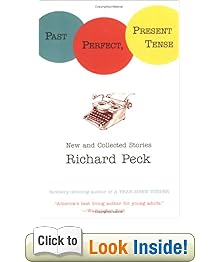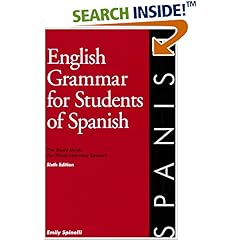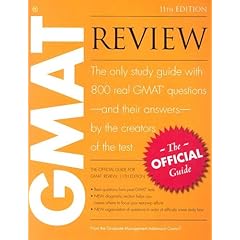This blog provides the materials of English grammar such as tense, questions, passive voice, sentence pattern, present tense, past tense, present continuous tense, past continuous tense present,part of speech, perfect continuous tense, past perfect tense, modal auxiliary, vocabulary, irregular verbs, noun phrase, dependent clause, noun clause, adjective clause, adverbial clause, sentence patterns, comparative, superlative, conditional sentences, noun, adjective, prepositional phrase.
Wednesday, September 24, 2008
Past Perfect, Present Tense
Description
Compiled for the first time, here are all of Newbery Award– winning author Richard Peck’s previously published short stories and two brand-new ones. From comedy to tragedy to historical to contemporary; from "Priscilla and the Wimps," Peck’s first short story, to "Shotgun Cheatham’s Last Night Above Ground," which inspired both A Long Way from Chicago and A Year Down Yonder, to "The Electric Summer," Peck’s jumping-off point for Fair Weather, readers will thrill at Peck’s engaging short fiction. Complete with the author’s own notes on the stories as well as tips and hints for aspiring writers and two new stories, this vibrant and varied collection offers something for everyone.
From AudioFile
Two new and 11 previously published short stories are combined with advice on writing from the author. Peck reads the literary advice himself, and, while he is far from a professional narrator, there is quite a bit of charm to hearing him talk about the fine art of writing fiction. The stories run the gamut from historical to gothic to realistic. Before each grouping, Peck tells listeners how he came to write the stories, and the inside view is fascinating. Lara Schwartzberg and Paul Boehmer are less successful; their narration is more serviceable than sparkling, with Schwartzberg's attempt at a British accent in the creepy "Waiting for Sebastian" a particular disappointment. Still, Peck's dry wit and enormous skill rise above most of the narration problems. This will certainly find a secure niche in writing classes. S.G. © AudioFile 2005, Portland, Maine-- Copyright © AudioFile, Portland, Maine --This text refers to an out of print or unavailable edition of this title.
Wednesday, September 17, 2008
English Grammar for Students of Spanish: English Grammar for Students of Spanish
Review: By R. Heijermans
I am a good English grammarian and speak and write intermediate Spanish. My Spanish studies are ongoing, and this book does a fabulous job of placing English and Spanish grammatical rules alongside one another for the sake of contrast and comparison. Spanish grammar is in some ways more difficult than English grammar in that Spanish requires number and gender agreement and more tenses and moods are distintly different. In addition, there are some challenging components (i.e., the por/para rules) that require a lot of prtactice and memorization. This book is a great help to the student of Spanish who knows English grammar well or to the one who would like to bone up on both.
Kaplan GMAT Premier Program, 2009 (Book & CD-ROM)
About the Author
Kaplan Publishing is one of the nation's top publishers of academic and professional development resources. We publish titles on topics such as test preparation, college and graduate school admissions, academic and career development in the legal, medical, education, and general business fields. Kaplan Publishing is the leading provider of test prep materials for a variety of standardized tests, including the GRE, GMAT, LSAT, SAT, PSAT, MCAT, TOEFL, and more.
Features:
* NEW! Essential math basics review section with practice drills
* 6 full-length practice tests (1 in the book, 1 online, 4 on the CD-ROM)
* Diagnostic test to target areas for score improvement
* Proven score-raising strategies
* Hundreds of additional practice questions
* Detailed answer explanations
* Personalized online progress report that adapts to a student's goals and schedule
The Official Guide for GMAT Review, 11th Edition
Review:By RG
This book, coupled with the Official GMAT Verbal and Quant Review Guides (by the same company, GMAC) is enough to give you a thorough understanding, of the type of questions that can be expected in the GMAT and the reasoning needed to answer them correctly. I found the reasoning provided with each answer, especially useful. Another nice thing about these books is that the questions are arranged in increasing order of difficulty. So, if you find some questions very easy, just jump a few questions forward. The only setback with these books is that they do not give detailed explanations in the 'concepts review sections'.
You will need to turn to other books/websites to get tips and tricks for the exam. I recommend Princeton for this purpose: The Princeton guide gave me very clear and effective test taking strategies that helped me a lot. I highly recommend NOT USING Kaplan, especially to take practice tests. The scoring is very tough, and you are tested in areas that are absolutely unnecessary for the GMAT. Also, very low scores on these tests are discouraging. I highly recommend taking the two Powerprep practice tests available for download from the GMAC website. These tests consist of 'retired' GMAT questions, and are very much identical to the actual GMAT. Your scoring on these tests would be identical to your actual GMAT score.
My practice scores are as below (in chronological order):
Powerprep Test 1: 630 (35 days before my GMAT)
Princeton Test 1: 650
Kaplan Test 1: 600
Princeton Test 2: 670
Princeton Test 3: 700
Princeton Test 4: 720
Kaplan Test 2: 530 (One day before my GMAT - Very, very discouraging!!)
Powerprep Test 2: 750 (One day before my GMAT)
Powerprep Test 3 (Reinstalled): 760 (with some repetitions from Powerprep Test 2)
GMAT: 750 (Verbal 40, Quant 50)
My GMAT Prep consisted of lots and lots of practice, analysis of my practice test results, and noting down where I erred, and making sure that I did not repeat my mistakes.
Wednesday, September 10, 2008
Yes/No Question Using "Was" and "Were"
Yes/No question using was and were is used in a past tense sentence which does not contain verb. We must not be confused with yes/no question using am, is or are. The difference is only the matter of Tense. Was/were is past tense while am/is/are is present tense. Look at the examples below:
1. Was he at home last night ?
(not is he at home last night?)
2. Were you sick two days ago?
(not Are you sick two days ago?)
3. Was she a diligent student when he studied in a university?
(not Is she a diligent student when he studied in a university?)
4. Were they in your house last week?
(not Are they in your house last week?)
5. Was your mother fat last year?)
(not Are your mother fat last year?
1. Was he at home last night ?
(not is he at home last night?)
2. Were you sick two days ago?
(not Are you sick two days ago?)
3. Was she a diligent student when he studied in a university?
(not Is she a diligent student when he studied in a university?)
4. Were they in your house last week?
(not Are they in your house last week?)
5. Was your mother fat last year?)
(not Are your mother fat last year?
Subscribe to:
Posts (Atom)




